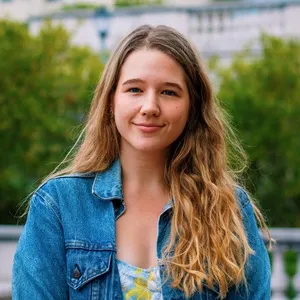I’ve always been told that breakfast is the most important meal of the day. I’ve always interpreted that to be a piece of personal wellness advice—kickstart your metabolism, fuel up for the day, somehow reverse last night’s bad decisions with eggs and bacon—and never considered that perhaps my breakfast choices are a little more existentially important than that. In his recent book, We Are The Weather, Jonathan Safran Foer argues that we all need to be more in-tune with what we’re eating, why we’re eating it, and what those decisions mean for others.
I attended his book talk last night, knowing little more than that the event was with Samin Nosrat, one of my favorite chefs, and was near campus. The talk was a display of great compassion, sometimes humor, and often a bit of tension. Two hours of listening later, I’m left reflecting on how food, and our decisions surrounding it, mean a good deal more than whether I’ll be hungry by lunch.
The “Meat” of the Discussion

Last night was far from the first time I’d thought about the far-reaching consequences of food-centered decisions, but listening to Safran Foer and Nosrat discuss We Are the Weather allowed me to further reflect on why, exactly, it’s so difficult to do things that are theoretically not that inconvenient for me to change. I don’t have to eat eggs for breakfast, but I like to. I don’t have to keep dairy ice cream in the freezer, but I like to. These decisions that run contrary to what I may know to be best for the environment, as Safran Foer argues, are not as benign or as isolated as they may seem when I’m writing my grocery list or standing in the frozen aisle at the grocery store.
While making the decision not to have bacon with breakfast will certainly not sequester any carbon or refreeze any ice caps, I don’t miss having meat with breakfast, and it is better for the environment than not doing so, so I do it despite its futility. Of course, the debate about vegetarianism, veganism, and the environment is not one that can be distilled into a few hundred words. There is too much evidence pointing to the fact that despite decades of pleas to stop supporting industrial agriculture with your dollars, nothing really has changed to justify an argument that individual decisions mean that much. This is where it got a little sticky at the talk, with Safran Foer sometimes coming across as stubborn or brash, but ultimately the takeaways from the talk were unaltered by his presentation.
Two Perspectives on Changing Habits

Safran Foer and Nosrat represented two perspectives on limiting animal product consumption: while he is vegan for most of the day, only eating animal products at dinner, she very openly talked about how much she loves good cheese, ice cream, and the occasional roast chicken (she is a chef beloved for her buttermilk roast chicken recipe, after all). He argued, somewhat proudly, that he gets greater satisfaction in knowing he’s moral than in eating a good steak. Nosrat, on the other hand, advocated more for cutting back as often as you’re able to, but still allowing yourself to indulge in things that bring you pleasure now and then, all the while being conscious of the choices that you’re making.
The point of Safran Foer’s We Are The Weather or Samin Nosrat telling her fans about her forays into sometimes-vegetarianism has never been to make everyone a vegan, or even a full-time vegetarian, or even to shame people into believing that their eating habits are destroying the Amazon or killing polar bears. The point is to be mindful of decisions we make every day, and to think more about why we make those decisions. This means cutting back on animal products when you’re able to and can afford to, and it means having more conversations about what’s happening to the climate and how we’re all tied to it in one way or another.
The Butterfly Effect

Nosrat emphasized a sort of “butterfly effect” that occurs when she talks about reducing her intake of animal products: it gets other people thinking about, talking about, and acting against climate change in ways that are both related to food and not. She noted that since climate-related food issues came onto her radar, she’s taken more time to educate herself on local politics and measures that could impact the environment, despite the fact that they may have nothing to do with food. Within the food industry, and perhaps perfectly illustrative of the fact that there are sustainable ways to consume animal products, she gave the example of Alice Waters, the storied founder of Chez Panisse. In 2001, Waters switched Chez Panisse to grass-fed beef, thereby starting a cascade throughout the food industry over the years resulting in grass-fed beef being commonplace in restaurants (Nosrat noted that she even bought a grass-fed dog treat for her puppy today as evidence of Waters’ impact).

The butterfly effect Nosrat mentioned is exactly the point: we are facing a crisis of existential proportions, and that can be overwhelming to the point of inaction. But keeping things as they are will not do anyone any good, so it is important to think and eventually act big, even if you’re only capable of acting small right now. Thinking about and acting against climate change, as it relates to food and not, is of the utmost importance as temperatures rise and years to act pass. So next time you order chicken for dinner, ask yourself why, and the next time you’re out to eat with someone, talk to them about climate change and what you’re doing about it (and the next time you vote, consider how your choices will impact the environment).


